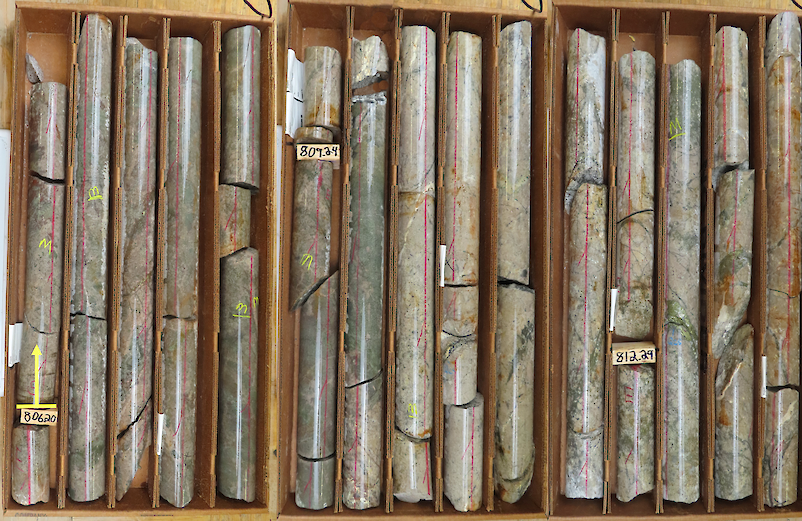The Credibility Crash
Source: David and Eric Coffin, HRA Advisories (9/2/11)
"Brinkmanship on one side, bumbling on the other, and markets caught in the middle: It's been a terrible month for markets."
Things turned hard in the markets since the last issue, and not in a good way. A lot of bad news has been priced into the market. At this point only time will tell whether that has impacted people hard enough to tip the slow growing developed countries into recession. Whichever way things go, it's going to be close.
Gold and, for once, senior gold stocks have been the place to be. Even if markets stabilize, gold has proven itself to more new owners that ever before. It would dip on stronger equity markets but it has reached another new plateau. Gold explorers make up the bulk of the updates and we have added a 2011 Yukon Watch list. Northern gold explorers continue to trade very well given the horrible market backdrop. We are still waiting for definitive results on this year's crop but it seems clear a winner in the region will trade better than the markets.
Traders are giving up on politicians and counting on central bankers. We may see better trading ahead of the U.S. Fed's Jackson Hole summit this weekend, the site of last year's QE2 announcement. We're not convinced yet there will be a QE3, so we could see more turbulence afterwards. Gold is the standout and will help companies that find it and mine it but the markets will not before the faint of heart for the next while.
Brinkmanship on one side, bumbling on the other and markets caught in the middle. It's been a terrible month for markets and an even worse one on the political leadership front. Markets have suffered the worst dive since 2008. The markets direction going forward is very much dependent on traders believing politicians can get ahead of the curve and "deal with" debts issues in the U.S. but especially in Europe.
Major indices in North America flirted with "bear market" drops of 20% and several large exchanges in Europe and elsewhere have already seen drops of that much and more. Traditional indicators of fear across the markets including Treasury yields, volatility readings and, of course, the gold price have been pushed to extremes.
While many of the debt troubles can be traced back to the 2008 debt crisis, its politics that have become the heart of current market issues. So far, politicians have proven to be inadequate to the task at hand. This does not bode well for the markets or the economy unless there is a sudden outbreak of stiff backbones and cooperativeness in the halls of power.
Leaders across the G7 (the ones not at their cottages at least) have insisted they were prepared to do whatever necessary to stop debt contagion. A nice sentiment but, like many similar pronouncements in recent weeks, it included no concrete plans. Lack of direction or a roadmap out of the current crisis is keeping markets on edge. Rumors of weakness at various large financial institutions are easily peddled, widely believed and traded viciously.
So far, the soothing has been left to central bankers. The ECB has been the most forthright and active. The European Central Bank has been buying up Italian and Spanish government debt to push those yield curves down. That was a brave move on the part of Jean Claude Trichet. It's no secret several members of the ECB board were screaming foul about that trade.
So far it's also a move that has worked. Yields on 10 year Italian and Spanish bonds have dropped 1.5% in the past two weeks. Two year notes issued by the Italian government on August 10th bore a 2.96% yield, 71 basis points below the yield on a similar auction a month ago.
In the U.S., it was left to Ben Bernanke to do something definitive, if not dramatic. At this month's Fed meeting, Bernanke put a timeline on the "extended period" of low rates, promising to keep the current rate in place until the middle of 2013.
This made markets happy for a couple of hours though it too drew catcalls from some. The move does take away a lot of flexibility from its actions. We're not sure how good a thing that is. The Fed already has constraints with such a dysfunctional bunch of politicians in Washington. The Fed board could still increase its balance sheet but many of the stronger actions it might contemplate would need political cover that isn't likely to be forthcoming.
There are several inflation hawks on the Fed board to satisfy. They won't be happy about the latest 0.5% CPI increase. We think some moderate inflation is the best thing that could happen to a debtor country issuing chits in its own currency. Inflation is the most painless way to debase the debt, even if it's a genie that's hard to control once it's out of the bottle.
In the U.S., down-to-the-wire debt ceiling negotiations combined with a cynical and ineffectual last minute agreement weakened the markets considerably. The big losers on both sides of the Atlantic have been the banking sector, though selling is broad based.
European politicians fared no better. EU members agreed to an expanded stability fund that most observers think should be three or four times the agreed size. This is based on the assumption fund would take over the job of sovereign bond buying from the ECB. Just getting the scaled down fund final approval will take a vote by 17 separate member country legislatures. The EU is not built for the speed that decision making during a financial crisis requires. The markets are making it clear they want to see concrete action, not just press conferences.
The U.S. deficit deal led to the loss of S&P's AAA rating. The announcement rocked markets worldwide but should not have been a surprise. The credit rater drew a line in the sand months earlier, insisting a plan to cut $4 billion (B) from U.S. federal deficits over 10 years was the minimum requirement for keeping AAA.
The Washington agreement promises $2.4B in cuts and most of that must be determined by a committee certain to be as fractious as this month's political farce.
Debt uncertainty, worries about recession, downgrades, runs on Italian debt and rumors of bank troubles in Europe created a perfect storm of selling. In the past few sessions markets clawed back some losses though daily swings have been huge and the markets are only one bad day away from lower lows. The question now is whether the combination of shocks has been powerful enough to create a recession.
Consumer spending and employment numbers in the U.S. were ok, if not great, for July. Weekly unemployment claim numbers have fallen back slightly though these can't be correlated to the monthly employment report with any real confidence. Corporate profits have remained strong and balance sheets are in the best shape they have been in for years. All these factors point to continued, albeit modest, growth.
On the downside, consumer sentiment numbers have been terrible. We've never found small moves in this reading to be predictive when of near term consumer spending but you can't ignore the worst reading in 30 years. The average person is clearly spooked right now. This could be enough to tip the U.S. into a recession.
The market massacre itself will reinforce negative sentiment. That impact will be blunted if the indices can gain a few more percent near term but something needs to spark a gain.
Recession or not is the crux of the matter now. If the U.S. and core EU countries avoid falling into recession then the markets are fairly valued at worst, and probably undervalued after the recent drop when compared to historically low treasury yields. If things continue to worsen and a number of countries fall into recession the market could still go lower. It's really that simple.
At this point it's, pun intended, a confidence game. The baseline numbers are not recessionary yet, but are getting closer all the time. Recession could come fast unless people believe the problems we all know about are being dealt with.
Few doubt that the U.S. can get past its debt and deficit issues if they want to. Interest rates at all-time lows and the ability to issue debt in its home currency gives the U.S. huge flexibility. For all the moaning, there is plenty of scope to increase revenues too. The real question is whether there is the political will to make the hard decisions. It doesn't look that way at the moment.
The U.S. agreement should force cuts if a plan isn't agreed to before year end. This may be as good as it gets. Even those cuts will be a drag on an economy with a weak growth rate. There is some logic to waiting on large cuts but we sympathize with those who don't want to. It's taken over a decade for Americans to even acknowledge the problem. If there is momentum to fix it no one wants to squander it at this point.
The debt issue is far more serious in Europe, but the confidence issue is the same. Aside from the PIGS, most European countries have debt/GDP ratios that are manageable, though not low. Most are lower than the U.S. for that matter. The real task in the short run is to convince markets that issues will be dealt with and not glossed over.
Credit markets are spooked bur not yet disarrayed like 2008. Yield spreads used to measure risk temperament like the TED spread, LIBOR and Treasury-OIS have risen but by amounts that are still small compared to 2008.
Concerns about some large French banks are disturbing, but at least they are French. Gallic pride will probably demand they be bailed out and a "Lehman scenario" doesn't seem likely under Paris' watch.
The only cure for this kind of situation is time and enough action by the political class to decrease uncertainty. If the large economies are still growing, it will show up in the numbers, with U.S. employment and consumer spending being the most heavily watched. Only time will tell when confidence lost during the past weeks of political farce will return.
On a positive note, market weakness has affected energy prices substantially. A $40/bbl drop in oil prices is a good tailwind, particularly for the U.S., if prices stay down. Also good are strong growth numbers out of China and India. Beijing is (finally!) letting the yuan rise. If that continues, the increased purchasing power would do a lot of good. With China's current inflation rate a new bout of government spending like late 2008 is very unlikely.
One thing different (so far) about this market drop is that resource stocks, especially juniors have not been harder hit. The percentage drop in the Venture index since late July is less than the S&P. If you've been through a few cycles like we have you know this is very unusual.
Gold prices are the main reason for this of course. Unlike 2008, many have taken refuge in the gold market this time, running the price past $1800/ounce.
A lot of it is fear buying. If the markets manage to calm themselves the pullback in gold prices is a reasonable expectation. We don't expect a massive drop. There is plenty of "disgust" buying along with the fear purchases. Its impressive how poorly the USD fared given the massive flows into the Treasury market. Some of that distrust will remain and support gold if it eases back to recent highs in the $16-1700 range.
Silver's industrial side kept it from matching gold's gains this month and the same is true for Platinum and Palladium. It's not as countercyclical as gold. If the markets calm it may outperform gold in the next while.
Things were anything but rosy for the red metal. Copper gets pounded hard right along with equity markets. We've expected a pullback even before major markets crashed. The speed of the downside move was impressive and it looks like a lot of longs have exited the market. The copper price is getting closer to reasonable but if markets fall harder copper will fall with them. We see no point in getting brave about copper equities until the markets sort themselves. The same holds for other base metals.
So far at least, bulk minerals like potash and iron ore have been almost unscathed by the crisis. Both moved up in price but that won't help producers and explorers in the bulk mineral space. The pro cyclical nature of these stocks is so ingrained that they will recover with and only with the larger indices.
We'd love to give you a definitive target for the major indices but to do that we would need to literally be mind readers. At a big picture level, a lot of the bad news is out there unless we encounter a "Lehman moment". From here forward growth, or lack thereof in the major economies will determine the direction of markets.
A return of confidence depends on citizens believing things won't get worse. That requires a greater sense of stability and purpose than politicians on either side of the Atlantic have delivered. If everyone acts on the assumption crises cannot be controlled then we will have a recession sooner rather than later. It's no more complicated than that.
Gold and discovery can help cushion things if some stability returns. There are not many bolt holes if it doesn't though gold and gold stocks would be the best of the worst. The market will be a very dangerous place for the next few months, even in the best case.
HRA Advisories is pleased to host the 2nd annual Subscriber Only event on September 26th in Vancouver. The Subscriber Investment Summit is intended to provide YOU with expert insight into today's resource market, as well as some of the most active public companies in the industry today. Don't miss out on last year's sold out event! For more details please go to: http://www.hraadvisory.com/summit_2011.html
The HRA – Journal, HRA-Dispatch and HRA- Special Delivery are independent publications produced and distributed by Stockwork Consulting Ltd, which is committed to providing timely and factual analysis of junior mining, resource, and other venture capital companies. Companies are chosen on the basis of a speculative potential for significant upside gains resulting from asset-based expansion. These are generally high-risk securities, and opinions contained herein are time and market sensitive. No statement or expression of opinion, or any other matter herein, directly or indirectly, is an offer, solicitation or recommendation to buy or sell any securities mentioned. While we believe all sources of information to be factual and reliable we in no way represent or guarantee the accuracy thereof, nor of the statements made herein. We do not receive or request compensation in any form in order to feature companies in these publications. We may, or may not, own securities and/or options to acquire securities of the companies mentioned herein. This document is protected by the copyright laws of Canada and the U.S. and may not be reproduced in any form for other than for personal use without the prior written consent of the publisher. This document may be quoted, in context, provided proper credit is given.
©2010 Stockwork Consulting Ltd. All Rights Reserved.
Published by Stockwork Consulting Ltd.
Box 85909, Phoenix AZ , 85071 Toll Free 1-877-528-3958
[email protected] http://www.hraadvisory.com
Gold and, for once, senior gold stocks have been the place to be. Even if markets stabilize, gold has proven itself to more new owners that ever before. It would dip on stronger equity markets but it has reached another new plateau. Gold explorers make up the bulk of the updates and we have added a 2011 Yukon Watch list. Northern gold explorers continue to trade very well given the horrible market backdrop. We are still waiting for definitive results on this year's crop but it seems clear a winner in the region will trade better than the markets.
Traders are giving up on politicians and counting on central bankers. We may see better trading ahead of the U.S. Fed's Jackson Hole summit this weekend, the site of last year's QE2 announcement. We're not convinced yet there will be a QE3, so we could see more turbulence afterwards. Gold is the standout and will help companies that find it and mine it but the markets will not before the faint of heart for the next while.
Brinkmanship on one side, bumbling on the other and markets caught in the middle. It's been a terrible month for markets and an even worse one on the political leadership front. Markets have suffered the worst dive since 2008. The markets direction going forward is very much dependent on traders believing politicians can get ahead of the curve and "deal with" debts issues in the U.S. but especially in Europe.
Major indices in North America flirted with "bear market" drops of 20% and several large exchanges in Europe and elsewhere have already seen drops of that much and more. Traditional indicators of fear across the markets including Treasury yields, volatility readings and, of course, the gold price have been pushed to extremes.
While many of the debt troubles can be traced back to the 2008 debt crisis, its politics that have become the heart of current market issues. So far, politicians have proven to be inadequate to the task at hand. This does not bode well for the markets or the economy unless there is a sudden outbreak of stiff backbones and cooperativeness in the halls of power.
Leaders across the G7 (the ones not at their cottages at least) have insisted they were prepared to do whatever necessary to stop debt contagion. A nice sentiment but, like many similar pronouncements in recent weeks, it included no concrete plans. Lack of direction or a roadmap out of the current crisis is keeping markets on edge. Rumors of weakness at various large financial institutions are easily peddled, widely believed and traded viciously.
So far, the soothing has been left to central bankers. The ECB has been the most forthright and active. The European Central Bank has been buying up Italian and Spanish government debt to push those yield curves down. That was a brave move on the part of Jean Claude Trichet. It's no secret several members of the ECB board were screaming foul about that trade.
So far it's also a move that has worked. Yields on 10 year Italian and Spanish bonds have dropped 1.5% in the past two weeks. Two year notes issued by the Italian government on August 10th bore a 2.96% yield, 71 basis points below the yield on a similar auction a month ago.
In the U.S., it was left to Ben Bernanke to do something definitive, if not dramatic. At this month's Fed meeting, Bernanke put a timeline on the "extended period" of low rates, promising to keep the current rate in place until the middle of 2013.
This made markets happy for a couple of hours though it too drew catcalls from some. The move does take away a lot of flexibility from its actions. We're not sure how good a thing that is. The Fed already has constraints with such a dysfunctional bunch of politicians in Washington. The Fed board could still increase its balance sheet but many of the stronger actions it might contemplate would need political cover that isn't likely to be forthcoming.
There are several inflation hawks on the Fed board to satisfy. They won't be happy about the latest 0.5% CPI increase. We think some moderate inflation is the best thing that could happen to a debtor country issuing chits in its own currency. Inflation is the most painless way to debase the debt, even if it's a genie that's hard to control once it's out of the bottle.
In the U.S., down-to-the-wire debt ceiling negotiations combined with a cynical and ineffectual last minute agreement weakened the markets considerably. The big losers on both sides of the Atlantic have been the banking sector, though selling is broad based.
European politicians fared no better. EU members agreed to an expanded stability fund that most observers think should be three or four times the agreed size. This is based on the assumption fund would take over the job of sovereign bond buying from the ECB. Just getting the scaled down fund final approval will take a vote by 17 separate member country legislatures. The EU is not built for the speed that decision making during a financial crisis requires. The markets are making it clear they want to see concrete action, not just press conferences.
The U.S. deficit deal led to the loss of S&P's AAA rating. The announcement rocked markets worldwide but should not have been a surprise. The credit rater drew a line in the sand months earlier, insisting a plan to cut $4 billion (B) from U.S. federal deficits over 10 years was the minimum requirement for keeping AAA.
The Washington agreement promises $2.4B in cuts and most of that must be determined by a committee certain to be as fractious as this month's political farce.
Debt uncertainty, worries about recession, downgrades, runs on Italian debt and rumors of bank troubles in Europe created a perfect storm of selling. In the past few sessions markets clawed back some losses though daily swings have been huge and the markets are only one bad day away from lower lows. The question now is whether the combination of shocks has been powerful enough to create a recession.
Consumer spending and employment numbers in the U.S. were ok, if not great, for July. Weekly unemployment claim numbers have fallen back slightly though these can't be correlated to the monthly employment report with any real confidence. Corporate profits have remained strong and balance sheets are in the best shape they have been in for years. All these factors point to continued, albeit modest, growth.
On the downside, consumer sentiment numbers have been terrible. We've never found small moves in this reading to be predictive when of near term consumer spending but you can't ignore the worst reading in 30 years. The average person is clearly spooked right now. This could be enough to tip the U.S. into a recession.
The market massacre itself will reinforce negative sentiment. That impact will be blunted if the indices can gain a few more percent near term but something needs to spark a gain.
Recession or not is the crux of the matter now. If the U.S. and core EU countries avoid falling into recession then the markets are fairly valued at worst, and probably undervalued after the recent drop when compared to historically low treasury yields. If things continue to worsen and a number of countries fall into recession the market could still go lower. It's really that simple.
At this point it's, pun intended, a confidence game. The baseline numbers are not recessionary yet, but are getting closer all the time. Recession could come fast unless people believe the problems we all know about are being dealt with.
Few doubt that the U.S. can get past its debt and deficit issues if they want to. Interest rates at all-time lows and the ability to issue debt in its home currency gives the U.S. huge flexibility. For all the moaning, there is plenty of scope to increase revenues too. The real question is whether there is the political will to make the hard decisions. It doesn't look that way at the moment.
The U.S. agreement should force cuts if a plan isn't agreed to before year end. This may be as good as it gets. Even those cuts will be a drag on an economy with a weak growth rate. There is some logic to waiting on large cuts but we sympathize with those who don't want to. It's taken over a decade for Americans to even acknowledge the problem. If there is momentum to fix it no one wants to squander it at this point.
The debt issue is far more serious in Europe, but the confidence issue is the same. Aside from the PIGS, most European countries have debt/GDP ratios that are manageable, though not low. Most are lower than the U.S. for that matter. The real task in the short run is to convince markets that issues will be dealt with and not glossed over.
Credit markets are spooked bur not yet disarrayed like 2008. Yield spreads used to measure risk temperament like the TED spread, LIBOR and Treasury-OIS have risen but by amounts that are still small compared to 2008.
Concerns about some large French banks are disturbing, but at least they are French. Gallic pride will probably demand they be bailed out and a "Lehman scenario" doesn't seem likely under Paris' watch.
The only cure for this kind of situation is time and enough action by the political class to decrease uncertainty. If the large economies are still growing, it will show up in the numbers, with U.S. employment and consumer spending being the most heavily watched. Only time will tell when confidence lost during the past weeks of political farce will return.
On a positive note, market weakness has affected energy prices substantially. A $40/bbl drop in oil prices is a good tailwind, particularly for the U.S., if prices stay down. Also good are strong growth numbers out of China and India. Beijing is (finally!) letting the yuan rise. If that continues, the increased purchasing power would do a lot of good. With China's current inflation rate a new bout of government spending like late 2008 is very unlikely.
One thing different (so far) about this market drop is that resource stocks, especially juniors have not been harder hit. The percentage drop in the Venture index since late July is less than the S&P. If you've been through a few cycles like we have you know this is very unusual.
Gold prices are the main reason for this of course. Unlike 2008, many have taken refuge in the gold market this time, running the price past $1800/ounce.
A lot of it is fear buying. If the markets manage to calm themselves the pullback in gold prices is a reasonable expectation. We don't expect a massive drop. There is plenty of "disgust" buying along with the fear purchases. Its impressive how poorly the USD fared given the massive flows into the Treasury market. Some of that distrust will remain and support gold if it eases back to recent highs in the $16-1700 range.
Silver's industrial side kept it from matching gold's gains this month and the same is true for Platinum and Palladium. It's not as countercyclical as gold. If the markets calm it may outperform gold in the next while.
Things were anything but rosy for the red metal. Copper gets pounded hard right along with equity markets. We've expected a pullback even before major markets crashed. The speed of the downside move was impressive and it looks like a lot of longs have exited the market. The copper price is getting closer to reasonable but if markets fall harder copper will fall with them. We see no point in getting brave about copper equities until the markets sort themselves. The same holds for other base metals.
So far at least, bulk minerals like potash and iron ore have been almost unscathed by the crisis. Both moved up in price but that won't help producers and explorers in the bulk mineral space. The pro cyclical nature of these stocks is so ingrained that they will recover with and only with the larger indices.
We'd love to give you a definitive target for the major indices but to do that we would need to literally be mind readers. At a big picture level, a lot of the bad news is out there unless we encounter a "Lehman moment". From here forward growth, or lack thereof in the major economies will determine the direction of markets.
A return of confidence depends on citizens believing things won't get worse. That requires a greater sense of stability and purpose than politicians on either side of the Atlantic have delivered. If everyone acts on the assumption crises cannot be controlled then we will have a recession sooner rather than later. It's no more complicated than that.
Gold and discovery can help cushion things if some stability returns. There are not many bolt holes if it doesn't though gold and gold stocks would be the best of the worst. The market will be a very dangerous place for the next few months, even in the best case.
HRA Advisories is pleased to host the 2nd annual Subscriber Only event on September 26th in Vancouver. The Subscriber Investment Summit is intended to provide YOU with expert insight into today's resource market, as well as some of the most active public companies in the industry today. Don't miss out on last year's sold out event! For more details please go to: http://www.hraadvisory.com/summit_2011.html
The HRA – Journal, HRA-Dispatch and HRA- Special Delivery are independent publications produced and distributed by Stockwork Consulting Ltd, which is committed to providing timely and factual analysis of junior mining, resource, and other venture capital companies. Companies are chosen on the basis of a speculative potential for significant upside gains resulting from asset-based expansion. These are generally high-risk securities, and opinions contained herein are time and market sensitive. No statement or expression of opinion, or any other matter herein, directly or indirectly, is an offer, solicitation or recommendation to buy or sell any securities mentioned. While we believe all sources of information to be factual and reliable we in no way represent or guarantee the accuracy thereof, nor of the statements made herein. We do not receive or request compensation in any form in order to feature companies in these publications. We may, or may not, own securities and/or options to acquire securities of the companies mentioned herein. This document is protected by the copyright laws of Canada and the U.S. and may not be reproduced in any form for other than for personal use without the prior written consent of the publisher. This document may be quoted, in context, provided proper credit is given.
©2010 Stockwork Consulting Ltd. All Rights Reserved.
Published by Stockwork Consulting Ltd.
Box 85909, Phoenix AZ , 85071 Toll Free 1-877-528-3958
[email protected] http://www.hraadvisory.com



































